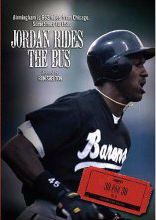More ESPN 30 For 30 Films
In a previous blog I wrote about how the library had begun to acquire the critically acclaimed ESPN 30 For 30 Films. Here are twelve more the library has on order:
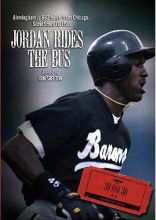 Jordan Rides the Bus - Shortly after leading the Chicago Bulls to their third straight NBA Championship in 1993, Michael Jordan walked away from the the game he had come to dominate and chose to try his hand at baseball. Jordan's stint with the Double A Birmingham Barons in the Chicago White Sox organization, under the leadership of future World Series Champion Manager Terry Francona, was far from successful, but was one of the most unique events in the sports world in recent decades. Whether it was the murder of his father, or the need for a new challenge, filmmaker Ron Shelton examines Jordan's experience and attempts to figure out the motivation for this dramatic change.
Jordan Rides the Bus - Shortly after leading the Chicago Bulls to their third straight NBA Championship in 1993, Michael Jordan walked away from the the game he had come to dominate and chose to try his hand at baseball. Jordan's stint with the Double A Birmingham Barons in the Chicago White Sox organization, under the leadership of future World Series Champion Manager Terry Francona, was far from successful, but was one of the most unique events in the sports world in recent decades. Whether it was the murder of his father, or the need for a new challenge, filmmaker Ron Shelton examines Jordan's experience and attempts to figure out the motivation for this dramatic change.
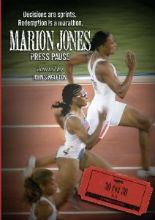 Marion Jones Press Pause - Few in the world of track and field have reached the heights or the depths of Marion Jones. From winning five medals at the 2000 Olympics in Sydney, to admitting to winning those medals while using steroids, and finally serving six months in prison for lying to federal investigators, Jones has experienced being on top of the world, and reaching rock bottom. In his film, John Singleton follows the rise, fall, and re-birth of Marion Jones as she is now attempting to put her life back together after serving her prison sentence.
Marion Jones Press Pause - Few in the world of track and field have reached the heights or the depths of Marion Jones. From winning five medals at the 2000 Olympics in Sydney, to admitting to winning those medals while using steroids, and finally serving six months in prison for lying to federal investigators, Jones has experienced being on top of the world, and reaching rock bottom. In his film, John Singleton follows the rise, fall, and re-birth of Marion Jones as she is now attempting to put her life back together after serving her prison sentence.
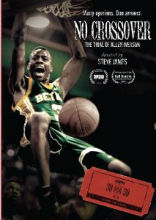 No Crossover: The Trial of Allen Iverson - Before Allen Iverson was crossing over defenders in the Big East and the NBA, he faced something much more difficult than double teams. While in high school, Iverson was arrested after a brawl at a bowling alley between his group of black friends and a group of white kids, and subsequently spent time in jail over the incident. Oscar nominated filmmaker Steve James takes a look back at this incident, how it split his hometown of Hampton, Virginia along racial lines, how it impacted Iverson, and how it still resonates in the community to this day.
No Crossover: The Trial of Allen Iverson - Before Allen Iverson was crossing over defenders in the Big East and the NBA, he faced something much more difficult than double teams. While in high school, Iverson was arrested after a brawl at a bowling alley between his group of black friends and a group of white kids, and subsequently spent time in jail over the incident. Oscar nominated filmmaker Steve James takes a look back at this incident, how it split his hometown of Hampton, Virginia along racial lines, how it impacted Iverson, and how it still resonates in the community to this day.
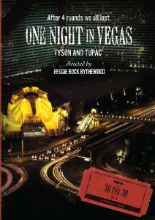 One Night in Vegas - On the evening of Sept. 7, 1996, Mike Tyson won the WBA title at the MGM Grand in Las Vegas, defeating Bruce Seldon in four rounds. What began as a night of triumph soon turned into a night of tragedy, however, when his good friend, rapper Tupac Shakur, was gunned down after leaving the fight en route to an after party. Director Reggie Bythewood revisits that tragic night, examining the events that took place, as well as the interesting friendship that existed between Tyson and Shakur.
One Night in Vegas - On the evening of Sept. 7, 1996, Mike Tyson won the WBA title at the MGM Grand in Las Vegas, defeating Bruce Seldon in four rounds. What began as a night of triumph soon turned into a night of tragedy, however, when his good friend, rapper Tupac Shakur, was gunned down after leaving the fight en route to an after party. Director Reggie Bythewood revisits that tragic night, examining the events that took place, as well as the interesting friendship that existed between Tyson and Shakur.
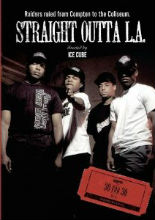 Straight Outta L.A. - When Al Davis moved the Raiders to Los Angeles in 1982, he probably never envisioned the cultural phenomenon his franchise would become to that city. With their silver and black colors and colorful reputation, the Raiders instantly appealed to many of the black and Hispanic residents of Los Angeles at a time when immigration and gang warfare were transforming the city. Director Ice Cube, who, as a member of the rap group N.W.A., was directly involved in making the silver and black a part of the hip hop scene and culturally significant to a new generation, looks back at how the Raiders became the toast of the town in the 1980s.
Straight Outta L.A. - When Al Davis moved the Raiders to Los Angeles in 1982, he probably never envisioned the cultural phenomenon his franchise would become to that city. With their silver and black colors and colorful reputation, the Raiders instantly appealed to many of the black and Hispanic residents of Los Angeles at a time when immigration and gang warfare were transforming the city. Director Ice Cube, who, as a member of the rap group N.W.A., was directly involved in making the silver and black a part of the hip hop scene and culturally significant to a new generation, looks back at how the Raiders became the toast of the town in the 1980s.
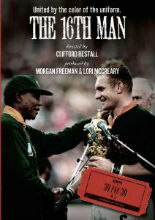 The 16th Man - Although rugby had always been seen as a sport the white population played in South Africa, Nelson Mandela viewed it as an opportunity to bring two separate nations together. In 1994, after the fall of apartheid, Mandela seized upon the South African rugby team as a means to unite the two races by showing his unconditional support for the team leading up to, and during the 1995 World Rugby Cup, which was held in South Africa. In his film, Cliff Bestall demonstrates how their success helped to unite the nation and showed the world how sports can bring people together.
The 16th Man - Although rugby had always been seen as a sport the white population played in South Africa, Nelson Mandela viewed it as an opportunity to bring two separate nations together. In 1994, after the fall of apartheid, Mandela seized upon the South African rugby team as a means to unite the two races by showing his unconditional support for the team leading up to, and during the 1995 World Rugby Cup, which was held in South Africa. In his film, Cliff Bestall demonstrates how their success helped to unite the nation and showed the world how sports can bring people together.
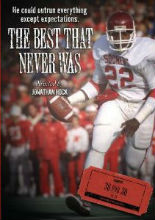 The Best That Never Was - Most people who saw Marcus Dupree play in high school thought he was the greatest running back they had ever seen. His talent led to a never before seen recruiting battle which eventually landed him in Norman, Oklahoma as a Sooner. Despite all of his promise, and flashes of brilliance on the collegiate level, injury, outside pressures, and conflict all led to a forgettable college career. Director Jonathan Hock takes a look at Dupree, trying to figure out why his star burned out so quickly, and showing us how he ultimately used football to redeem himself.
The Best That Never Was - Most people who saw Marcus Dupree play in high school thought he was the greatest running back they had ever seen. His talent led to a never before seen recruiting battle which eventually landed him in Norman, Oklahoma as a Sooner. Despite all of his promise, and flashes of brilliance on the collegiate level, injury, outside pressures, and conflict all led to a forgettable college career. Director Jonathan Hock takes a look at Dupree, trying to figure out why his star burned out so quickly, and showing us how he ultimately used football to redeem himself.
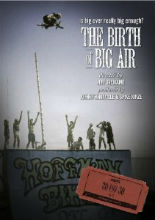 The Birth of Big Air - In 1985, at the age of 13, Mat Hoffman entered into the BMX circuit as an amateur, and by 16, he had risen to the professional level. Throughout his storied career, Hoffman has ignored conventional limitations; instead focusing his efforts on the purity of the sport and the pursuit of "what's next." His motivations stem purely from his own ambitions, and even without endorsements, cameras, fame, and fans, Hoffman would still would be working to push the boundaries of gravity. Academy Award nominee Spike Jonze showcases the inner workings and exploits of the man who gave birth to "Big Air."
The Birth of Big Air - In 1985, at the age of 13, Mat Hoffman entered into the BMX circuit as an amateur, and by 16, he had risen to the professional level. Throughout his storied career, Hoffman has ignored conventional limitations; instead focusing his efforts on the purity of the sport and the pursuit of "what's next." His motivations stem purely from his own ambitions, and even without endorsements, cameras, fame, and fans, Hoffman would still would be working to push the boundaries of gravity. Academy Award nominee Spike Jonze showcases the inner workings and exploits of the man who gave birth to "Big Air."
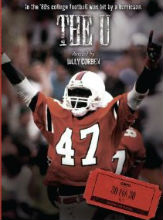 The U - Throughout the 1980s, the University of Miami was at the center of a racial and cultural shift taking place throughout the country. A predominantly white university, the school's image was forever changed when coach Howard Schnellenberger scoured some of the toughest ghettos in Florida to recruit mostly black players for his team. With a newly branded swagger, these Hurricanes' football players took on larger-than-life personalities and won four national titles between 1983 and 1991. Filmmaker Billy Corben, a Miami native and University of Miami alum, tells the story of how these "Bad Boys" of football changed the attitude of the game they played, and how this serene campus was transformed into "The U."
The U - Throughout the 1980s, the University of Miami was at the center of a racial and cultural shift taking place throughout the country. A predominantly white university, the school's image was forever changed when coach Howard Schnellenberger scoured some of the toughest ghettos in Florida to recruit mostly black players for his team. With a newly branded swagger, these Hurricanes' football players took on larger-than-life personalities and won four national titles between 1983 and 1991. Filmmaker Billy Corben, a Miami native and University of Miami alum, tells the story of how these "Bad Boys" of football changed the attitude of the game they played, and how this serene campus was transformed into "The U."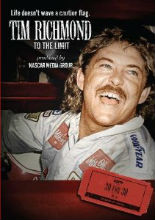 Tim Richmond to the Limit - Born into a wealthy family, Tim Richmond was the antithesis of the Southern blue-collar, dirt-track racers who dominated NASCAR. He also was a flamboyant showman who basked in the attention of the media and fans - especially the attention of female admirers. In 1986, when he won seven NASCAR races and finished third in the Winston Cup series points race, some believed he was on the verge of stardom. But his freewheeling lifestyle soon caught up to him, as he unexpectedly withdrew from the NASCAR racing circuit, reportedly suffering from double pneumonia. In reality, the diagnosis was much more dire: He had AIDS. Emmy Award-winning filmmaker Rory Karpf examines the life and tragic death of one of NASCAR's shooting stars.
Tim Richmond to the Limit - Born into a wealthy family, Tim Richmond was the antithesis of the Southern blue-collar, dirt-track racers who dominated NASCAR. He also was a flamboyant showman who basked in the attention of the media and fans - especially the attention of female admirers. In 1986, when he won seven NASCAR races and finished third in the Winston Cup series points race, some believed he was on the verge of stardom. But his freewheeling lifestyle soon caught up to him, as he unexpectedly withdrew from the NASCAR racing circuit, reportedly suffering from double pneumonia. In reality, the diagnosis was much more dire: He had AIDS. Emmy Award-winning filmmaker Rory Karpf examines the life and tragic death of one of NASCAR's shooting stars.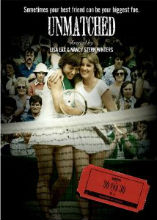 Unmatched - No individual sports rivalry can boast the intensity and impact of the one between Chris Evert and Martina Navratilova. Fierce competitors, the two lifted each other to heights that each couldn't have reached without the other. On the court, their battles were fought hard. But even more remarkable is what happened off the court, as they formed a strong and lasting friendship, bonding them to this day. Filmmakers Lisa Lax and Nancy Stern Winters, provide a personal look into one of sports' greatest rivalries, capturing these two extraordinary athletes at their most unguarded moments; including an intimate one-on-one conversation between Chris & Martina as they share their recollections and stories of tennis and friendship.
Unmatched - No individual sports rivalry can boast the intensity and impact of the one between Chris Evert and Martina Navratilova. Fierce competitors, the two lifted each other to heights that each couldn't have reached without the other. On the court, their battles were fought hard. But even more remarkable is what happened off the court, as they formed a strong and lasting friendship, bonding them to this day. Filmmakers Lisa Lax and Nancy Stern Winters, provide a personal look into one of sports' greatest rivalries, capturing these two extraordinary athletes at their most unguarded moments; including an intimate one-on-one conversation between Chris & Martina as they share their recollections and stories of tennis and friendship.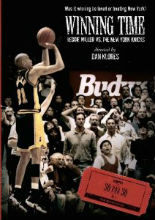 Winning Time: Reggie Miller vs the New York Knicks - Reggie Miller single-handedly crushed the heart of New York Knick fans multiple times. But it was the 1995 Eastern Conference Semifinals which solidified Miller as Public Enemy #1 in New York City. With moments to go in Game 1 and facing a seemingly insurmountable deficit of 105-99, Miller scored eight points in 8.9 seconds to give his Indiana Pacers an astonishing victory. This career-defining performance, combined with his on-court give-and-take with Knicks fan Spike Lee, helped establish Miller's legend. Through highlights and interviews with Miller, his sister Cheryl, Spike Lee, Patrick Ewing and many others, Peabody Award-winning director Dan Klores uses humor and wit to capture the intensity of the rivalry between the two cities.
Winning Time: Reggie Miller vs the New York Knicks - Reggie Miller single-handedly crushed the heart of New York Knick fans multiple times. But it was the 1995 Eastern Conference Semifinals which solidified Miller as Public Enemy #1 in New York City. With moments to go in Game 1 and facing a seemingly insurmountable deficit of 105-99, Miller scored eight points in 8.9 seconds to give his Indiana Pacers an astonishing victory. This career-defining performance, combined with his on-court give-and-take with Knicks fan Spike Lee, helped establish Miller's legend. Through highlights and interviews with Miller, his sister Cheryl, Spike Lee, Patrick Ewing and many others, Peabody Award-winning director Dan Klores uses humor and wit to capture the intensity of the rivalry between the two cities.








